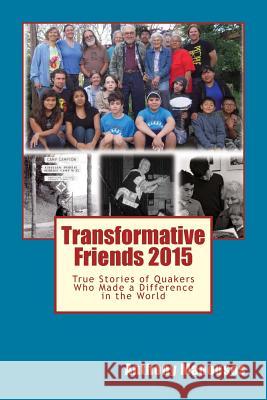Transformative Friends » książka
Transformative Friends
ISBN-13: 9781499729184 / Angielski / Miękka / 2014 / 114 str.
Biographies of seven remarkable Quakers--William Lovett, Robert Vogel, Josephine Duveneck, Heberto Sein, Marjorie Sykes, John and Alice Way, and Albert Bigelow--who made a difference in the world: social visionaries, radical educators, activist mystics, interfaith and intercultural bridge-builders, builder of homes for migrant workers and a Naval Commander turned pacifist. This book not only tells their amazing stories, much of it in their own words, but it also provides questions and exercises to help you find ways to let your life speak. Descended from Quakers going back to Colonial times, BILL LOVETT grew up on a farm in Eastern Pennsylvania that was deeded to his family by William Penn. A passionate pacifist all his life, he served time in prison during World War II because of his uncompromising commitment to conscientious objection. He later became involved in helping low-income farmworkers in the Central Valley build affordable homes through Self-Help Enterprises, a precursor to Habitat for Humanity. ROBERT VOGEL (1917-1998) was a conscientious objector during WW II, became a Quaker during grad school and spent three years in a Civilian Public Service (CPS) camp rather than join the military. There he began working for the AFSC-an organization that he served faithfully for over forty years. During his years as AFSC staff, he worked on peace education and traveled through the world visiting and supporting Quaker work in China, Japan, Africa, the Middle East, Latin America and the Soviet Union-as well as visiting Friends throughout the United States. He built bridges not only with America's "enemies," but also between different branches of Quakers: he was a true ambassador for peace. He also served as president of the Southern California Chapter of the ACLU, where he opposed loyalty oaths and was party to the successful court case, Vogel v. County of Los Angeles, that overthrew the special non-disloyalty oath required of all civil servants in California. JOSEPHINE DUVENECK (1891-1978) came from a well-to-do Boston family and had a deep concern for social justice, peace and young people. In the 1920s she and her husband Frank purchased a 1000-acre ranch near Palo Alto called Hidden Villa. This became a center for social, educational, environmental, and humanitarian activities. In summer it was a youth camp, to which the Duvenecks brought minority and disadvantaged children, and minority counselors, which given the mostly white demographics of the San Francisco Peninsula, was particularly unusual and innovative. It had the first youth hostel on the Pacific Slope. World War II refugees and Japanese-American victims of the World War II 'relocation'-internment-were released to Hidden Villa. HEBERTO SEIN (1898-1977), a Mexican Quaker, activist, poet and interpreter, and one of the founders of Mexico City Friends Meeting and Casa de los Amigos. JOHN AND ALICE WAY, founders and co-directors of Pacific Ackworth Friends School in Temple City, California. John (1906-1986) and Alice (1909-1989) were social visionaries involved in the cooperative movement as well as in AFSC. MARJORIE SYKES (1905-1995), a notable Quaker who lived and worked as an educator in India and was a friend and colleague of Tagore and Gandhi. ALBERT SMITH BIGELOW (1906-1993), a pacifist and former United States Navy Commander, who came to prominence in the 1950s as the skipper of the Golden Rule, the first vessel to attempt disruption of a nuclear test in protest against nuclear weapons. Peace, justice and radical transformation-these are the concerns that link these three Transformative Friends.
Zawartość książki może nie spełniać oczekiwań – reklamacje nie obejmują treści, która mogła nie być redakcyjnie ani merytorycznie opracowana.











